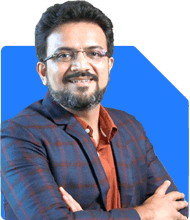Hi Sir,
Regarding recent turmoils in global economic situation and trends, Trump's tariffs, relentless FII selling, should I be worried about midcap, large&midcap funds that I have in my mutual fund portfolio? I have been investing from last 4 years and want to invest for next 10 years only. And then plan to retire and move to SWP. I'm targeting a 10%-11% return eventually. And I don't want to make lower returns than FD's. Is now the time to switch from midcap, laege&midcap to conservative, large, flexi funds? Please suggest.
Ans: You have asked the right question at the right time. Many investors panic only after damage happens. You are thinking ahead. That is a strong habit.
You also have clarity about your goal, time horizon and expected returns. This mindset will help you handle market noise better.
» Current Market Sentiment and Global Events
The global economy is seeing stress. There are trade decisions, tariff announcements, and geopolitical issues. Foreign institutional investors are selling. News flow looks negative.
These events can cause short term volatility. Midcaps and small caps usually react faster during these phases. Even large caps show some stress.
But markets have seen many crises in the past. Elections, governments, conflicts, pandemics, financial crashes and tariff wars are not new events. Markets always recover over time.
Short term movements are unpredictable. Long term wealth creation depends more on patience and asset allocation.
» Your Time Horizon Matters More Than Market Noise
You have been investing for 4 years. You plan to invest for the next 10 years. That means your remaining maturity is long term.
For a 10 year goal, equity is suitable. Midcap and large and midcap funds are designed for long term investors. They are not meant for short periods.
If your time horizon is short, it is valid to worry about downside risk. But with 10 more years ahead, temporary volatility is normal and expected.
Short term fear should not drive long term decisions.
» Should You Switch to Conservative or Large Cap Now?
Switching based on panic or temporary news is not ideal. When you switch now, you lock the current lower value permanently. You also miss the recovery phase.
Large cap and flexi cap funds offer stability. But they also deliver lower growth potential during bull runs compared to midcaps.
Midcaps usually fall deeper when markets drop. But they also recover faster and often outperform in the next cycle.
Switching now may protect emotions but may reduce long term wealth creation.
» Target Return of 10% to 11% is Reasonable
Aiming for 10%-11% return with a 10 year investment horizon is realistic.
Fixed deposits now offer around 6.5% to 7.5%. After tax, the return becomes lower.
Equity funds have potential to generate better returns compared to FD over a long tenure. Midcap allocation contributes to this return potential.
So moving fully to conservative funds may reduce your ability to beat inflation comfortably.
» Impact of FII Selling
FII selling creates pressure on the market. But domestic investors including SIP flows are strong today. India is seeing strong structural growth.
Retail investors, mutual funds and systematic flows act as stabilizers.
FII selling is temporary and cyclical. It is not a permanent trend.
» Economic Slowdowns Create Opportunities
Corrections make valuations reasonable. This can benefit long term SIP investors.
During downturns, your SIP buys more units. During recovery, these units grow.
This mechanism works best in volatile categories like midcaps.
Stopping SIP or switching during dips blocks this benefit.
» Midcap Cycles Are Natural
Midcap funds move in cycles. They have phases of strong growth followed by correction. The correction phase is painful but temporary.
Every cycle contributes to future upside. Staying invested during all phases is important.
Many investors exit during downturns and enter again after markets rise. This behaviour produces lower returns than the mutual fund performance.
» Role of Portfolio Balance
Instead of exiting fully, review your asset allocation. You can hold a mix of:
– Large cap
– Flexi cap
– Midcap
– Large and midcap
This gives stability and growth potential.
Midcap should not be more than a suitable percentage for your age and risk tolerance. Since you are 36, some meaningful midcap exposure is fine.
If midcap exposure is very high, you can reduce slightly and move that portion to flexi cap or large cap funds slowly through a systematic transfer. Do not do a lump sum shift during panic.
» Behavioural Discipline Matters More Than Fund Selection
Market cycles test investor patience. Consistency in SIP and holding through declines builds wealth.
Most investors do not fail due to bad funds. They fail due to fear-based decisions.
Your approach should be systematic, not emotional.
» Do Not Compare with FD Frequently
FD gives predictable return. Equity gives volatile but higher potential return.
Comparing FD returns every time the market falls leads to wrong decisions.
FD is for safety. Equity is for growth. They serve different purposes.
Your retirement plan and SWP plan depends on growth. Only equity can provide that growth.
» Should You Change Strategy Because Retirement is 10 Years Away?
Now is not the time to exit growth segments. You are still in accumulation phase.
When you reach the last 3 years before retirement, then reducing equity exposure step by step is required.
At that stage, a glide path helps preserve gains. That time has not yet come.
So continue building wealth now.
» Market Timings and Shifts Rarely Work
Many investors try to predict markets. Most of them fail.
Switching based on news looks logical. But news and market timing rarely align.
Staying consistent with your asset allocation gives better results than frequent changes.
» Portfolio Review Approach
You can follow these steps:
– Continue SIPs in all categories
– Avoid stopping based on short term fears
– If midcap allocation is above comfort level, shift only small portion gradually
– Review allocation once in a year, not every month
This structured approach prevents emotional decisions.
» Tax Rules Matter When Switching
Switching between equity funds involves tax impact.
Short term capital gains tax is higher.
Long term capital gains above the exemption limit are taxed at 12.5%.
Switching without purpose can create avoidable tax leakage.
This reduces your compounding.
» When to Worry?
You need to reconsider only if:
– Your goal horizon becomes short
– Your risk appetite changes
– Your allocation becomes unbalanced
Not because of headlines or temporary corrections.
» Your Retirement SWP Plan
Once your accumulation phase is completed, you can shift to:
– Conservative hybrid
– Flexi cap
– Balanced allocation
This will support a smoother SWP.
But this transition should happen only closer to the retirement start date. Not now.
» SIP is Designed for Turbulent Years
SIP works best when markets are volatile. The hardest years for emotions are the most powerful for compounding.
Your long term discipline is your strategy.
Do not interrupt it.
» What You Should Do Now
– Stay invested
– Continue SIP
– Avoid panic selling
– Review allocation once a year
– Use a steady plan, not reactions
This will help you reach your target return range.
» Finally
You are on the right path. The current volatility is temporary. Your 10 year horizon gives enough time for recovery and growth.
Switching right now based on fear may reduce your future returns. Staying invested and continuing SIPs is the sensible approach.
Your goal of better return than FD is realistic. Equity can deliver that with patience.
Stay calm and systematic.
Best Regards,
K. Ramalingam, MBA, CFP,
Chief Financial Planner,
www.holisticinvestment.in
https://www.youtube.com/@HolisticInvestment

























